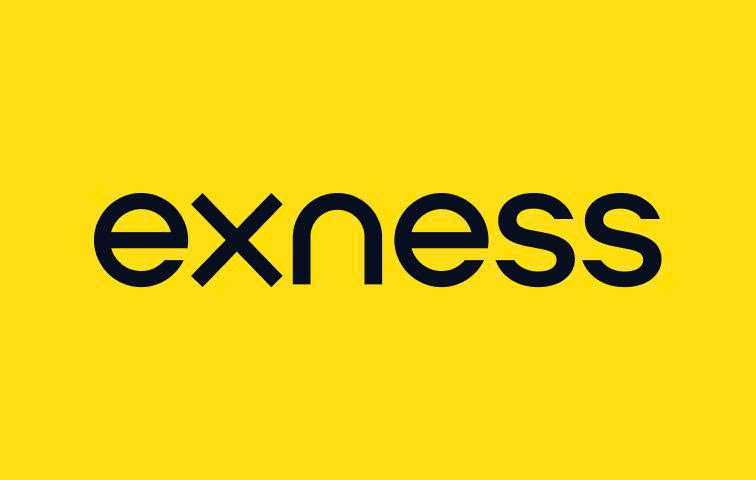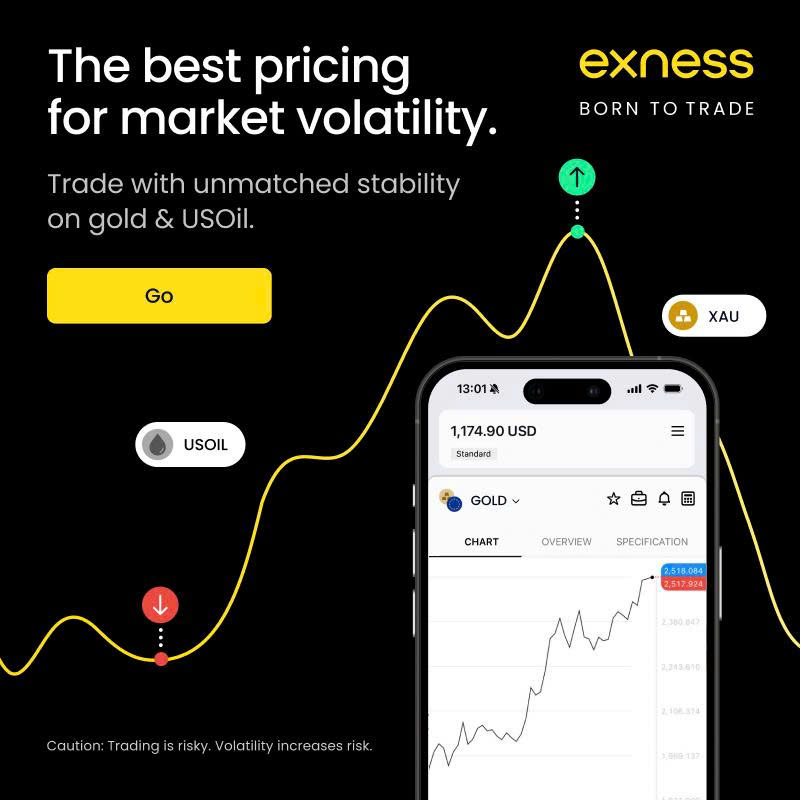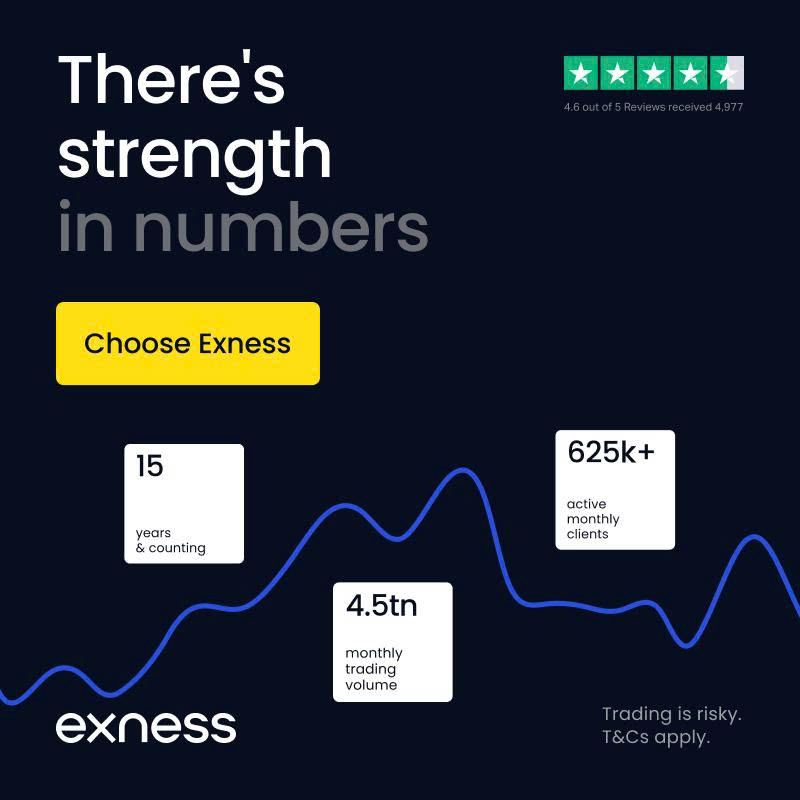
9 minute read
Exness Review Nigeria: Is It the Best Forex Broker for Nigerian Traders
from Exness
by Exness Blog
If you're a Nigerian trader looking for a reliable forex broker, you've likely come across Exness. With its global reputation, low spreads, and user-friendly platforms, Exness has become a popular choice for traders in Nigeria. But is it truly the best broker for you? In this comprehensive Exness review Nigeria, we’ll dive into its features, pros, cons, and how it caters specifically to Nigerian traders. Whether you're a beginner or a seasoned trader, this guide will help you decide if Exness is worth your investment in 2025.

💥 Trade with Exness now: Open An Account or Visit Brokers 🏆
What Is Exness? A Brief Overview
Exness is a globally recognized forex and CFD broker, established in 2008. Headquartered in Cyprus, it has grown to serve over 1 million active users worldwide, with a strong presence in Nigeria. Known for its transparency, competitive trading conditions, and advanced technology, Exness offers access to a wide range of financial instruments, including forex, commodities, cryptocurrencies, indices, and stocks.
For Nigerian traders, Exness stands out due to its low minimum deposit, support for the Nigerian Naira (NGN) as a base currency, and localized payment methods. But how does it stack up in terms of regulation, fees, and user experience? Let’s explore.
Is Exness Legit and Safe for Nigerian Traders?
One of the first questions any trader asks is whether a broker is legitimate and safe. Exness is a well-regulated broker, operating under multiple top-tier regulatory bodies, including:
· Financial Conduct Authority (FCA) in the UK (license number 730729)
· Cyprus Securities and Exchange Commission (CySEC) (license number 178/12)
· Financial Services Authority (FSA) in Seychelles (license number SD025)
· Financial Sector Conduct Authority (FSCA) in South Africa (license number 51024)
While Exness is not directly regulated by Nigeria’s Securities and Exchange Commission (SEC), its international licenses ensure compliance with strict guidelines on fund security, transparency, and ethical trading practices. Nigerian traders are typically registered under the FSA in Seychelles, which, while considered an offshore regulator, still enforces robust standards.
Exness enhances safety through:
· Segregated Accounts: Client funds are kept separate from the broker’s operational funds, ensuring protection in case of financial difficulties.
· Advanced Encryption: Secure Socket Layer (SSL) technology protects transactions and personal data.
· Regular Audits: Financial statements are audited by Deloitte, one of the Big Four global accounting firms, ensuring transparency.
For Nigerian traders, these measures provide peace of mind, though the lack of local SEC regulation means you should trade cautiously and understand the risks involved.
Exness Trading Platforms: What’s Available for Nigerians?
Exness offers a variety of trading platforms tailored to different trading styles, all accessible to Nigerian traders:
1. MetaTrader 4 (MT4)
MT4 is a favorite among forex traders for its user-friendly interface, advanced charting tools, and support for automated trading via Expert Advisors (EAs). Nigerian traders can use MT4 on desktop, mobile, or web browsers.
2. MetaTrader 5 (MT5)
MT5 is an upgraded version of MT4, offering more timeframes, advanced indicators, and support for additional asset classes like stocks and cryptocurrencies. It’s ideal for traders looking for a more robust platform.
3. Exness Trade App
The proprietary Exness Trade App is perfect for mobile trading. It offers real-time quotes, one-tap trading, and seamless account management, making it convenient for Nigerian traders on the go.
4. Exness Terminal
A web-based platform with a sleek interface, the Exness Terminal is designed for traders who prefer browser-based trading without downloading software.
All platforms support the Nigerian Naira (NGN) as a base currency, allowing traders to avoid currency conversion fees. The availability of Hausa, Yoruba, and English language options further enhances accessibility for Nigerian users.
Account Types: Which One Suits Nigerian Traders?
Exness offers a range of account types to cater to different experience levels and trading strategies. Here’s a breakdown:
1. Standard Accounts
· Standard Account: Ideal for beginners, with a $10 minimum deposit (approximately 7,775 NGN), spreads starting at 0.3 pips, and no commission fees.
· Standard Cent Account: Designed for new traders, this account allows trading in cents, reducing risk. It’s perfect for practicing strategies with minimal capital.
2. Professional Accounts
· Raw Spread Account: Offers spreads from 0.0 pips with a fixed commission per trade. Suitable for high-volume traders.
· Zero Account: Features zero spreads on top instruments for 95% of the trading day, with a commission per trade.
· Pro Account: A commission-free account with tighter spreads, ideal for experienced traders who prefer instant execution.
For Nigerian traders, the Standard and Standard Cent accounts are excellent starting points due to their low entry barriers. Muslim traders can also opt for swap-free accounts, which comply with Sharia law.

💥 Trade with Exness now: Open An Account or Visit Brokers 🏆
Trading Instruments Available on Exness
Exness provides access to over 200 trading instruments, allowing Nigerian traders to diversify their portfolios:
· Forex: Over 100 currency pairs, including majors (EUR/USD, GBP/USD), minors, and exotics.
· Stocks: CFDs on global giants like Apple, Tesla, and Amazon.
· Commodities: Precious metals (gold, silver, platinum) and energies (crude oil, natural gas).
· Indices: Popular indices like the S&P 500, Dow Jones, and US Tech 100.
· Cryptocurrencies: Trade Bitcoin, Ethereum, and other digital assets.
The variety ensures Nigerian traders can explore multiple markets, from forex to crypto, all from a single platform.
Fees and Spreads: How Cost-Effective Is Exness?
Exness is known for its competitive fee structure, which is a significant advantage for Nigerian traders:
· Spreads: Start at 0.3 pips for Standard accounts and 0.0 pips for Professional accounts. For example, the EUR/USD pair averages 1.0 pip on Standard accounts, which is lower than industry standards.
· Commissions: No commissions on Standard and Pro accounts; Raw Spread and Zero accounts charge a fixed commission per lot.
· Swap Fees: Charged for holding positions overnight, but swap-free accounts are available for Muslim traders.
· Deposit/Withdrawal Fees: Exness typically doesn’t charge fees for deposits or withdrawals, though third-party payment providers may apply charges.
The low minimum deposit of $1 (approximately 750 NGN) makes Exness accessible to traders with limited capital, a crucial factor in Nigeria’s dynamic economy.
Payment Methods for Nigerian Traders
Exness offers a variety of payment methods tailored to Nigerian traders, ensuring fast and convenient transactions:
· Bank Transfers: Via local Nigerian banks like Wema Bank.
· Mobile Money: Popular options like OPay and Flutterwave.
· E-Wallets: Skrill, Neteller, and PerfectMoney.
· Cryptocurrencies: Bitcoin and other digital currencies.
Deposits are instant, while withdrawals are processed within 24 hours in most cases. The ability to transact in NGN eliminates currency conversion costs, making Exness a cost-effective choice.
Exness Educational Resources and Tools
Exness is committed to empowering traders with knowledge, offering a robust set of educational resources:
· Exness Academy: Free webinars, tutorials, and articles for beginners and intermediate traders.
· Market Analysis: Economic calendars, news feeds, and technical analysis reports.
· Trading Tools: Currency converters, investment calculators, and Trading Central WebTV for market insights.
· Demo Accounts: Practice trading with virtual funds to hone your skills risk-free.
These resources are particularly valuable for Nigerian traders, many of whom are new to forex trading and need structured learning materials.
Customer Support: How Responsive Is Exness in Nigeria?
Exness provides 24/7 customer support through multiple channels, including:
· Live Chat: Instant assistance in English, Hausa, Yoruba, and other languages.
· Email: For detailed inquiries.
· Phone: Local phone numbers for Nigerian traders.
User feedback highlights Exness’s prompt and professional support, though some traders report occasional delays during peak hours. The availability of localized support in Nigeria is a significant advantage.
Pros and Cons of Exness for Nigerian Traders
Pros
· Low minimum deposit ($1–$10), accessible for all traders.
· Competitive spreads starting at 0.0 pips.
· Support for NGN as a base currency, reducing conversion fees.
· Swap-free accounts for Muslim traders.
· Wide range of trading instruments and platforms.
· Robust regulation and fund security measures.
· Localized payment methods and customer support.
Cons
· Not directly regulated by Nigeria’s SEC, which may concern some traders.
· No local office or phone number in Nigeria.
· Withdrawal delays during peak trading hours.
· Limited bonus offers compared to some competitors.
How Does Exness Compare to Other Brokers in Nigeria?
To provide context, let’s compare Exness to two other popular brokers in Nigeria: XM and FBS.
· Exness vs. XM: XM offers a similar low minimum deposit ($5) and is regulated by multiple authorities, including CySEC. However, Exness has tighter spreads and more trading instruments, while XM provides more promotional bonuses.
· Exness vs. FBS: FBS is known for its high leverage (up to 1:3000) and bonuses, but Exness offers faster execution and a more transparent fee structure. FBS also lacks NGN as a base currency.
Exness’s combination of low costs, NGN support, and diverse platforms gives it an edge for Nigerian traders seeking reliability and flexibility.
User Experiences: What Nigerian Traders Say About Exness
Feedback from Nigerian traders on platforms like Trustpilot and Traders Union is overwhelmingly positive. Common praises include:
· Ease of Use: The intuitive platforms and low deposit requirements make Exness beginner-friendly.
· Fast Transactions: Deposits and withdrawals are quick, with minimal fees.
· Reliability: Traders appreciate the broker’s transparency and regulatory compliance.
However, some users mention challenges with account verification and occasional withdrawal delays. Overall, Exness enjoys a 4-star rating on Trustpilot, reflecting high satisfaction.
Tips for Nigerian Traders Using Exness
· Start with a Demo Account: Practice strategies without risking real money.
· Choose the Right Account: Beginners should opt for the Standard or Standard Cent account, while experienced traders can explore Professional accounts.
· Leverage Wisely: Exness offers leverage up to 1:2000, but high leverage increases risk.
· Use Educational Resources: Take advantage of Exness Academy to improve your skills.
· Monitor Fees: Be aware of swap fees if holding positions overnight, unless using a swap-free account.
Conclusion: Is Exness the Right Broker for You in Nigeria?
Exness is a strong contender for Nigerian traders in 2025, thanks to its low costs, diverse trading instruments, and user-friendly platforms. Its support for NGN, localized payment methods, and robust educational resources make it particularly appealing in Nigeria’s growing forex market. While the lack of local SEC regulation and occasional withdrawal delays are drawbacks, Exness’s global reputation and transparency outweigh these concerns for most traders.
If you’re looking for a reliable, cost-effective broker to kickstart or advance your trading journey, Exness is worth considering. Open a demo account today to explore its features risk-free and see if it aligns with your trading goals.
💥 Note: To enjoy the benefits of the partner code, such as trading fee rebates, you need to register with Exness through this link: Open An Account or Visit Brokers 🏆
Read more:

